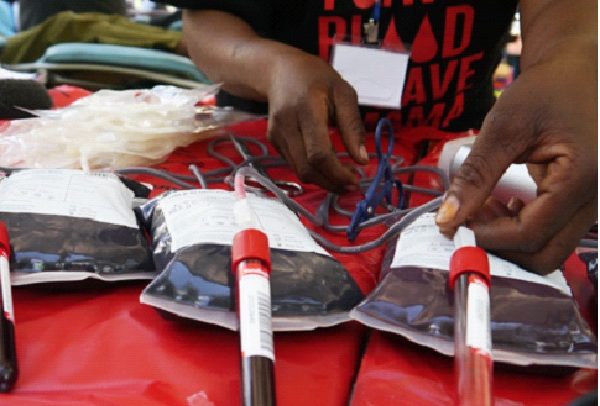Pints of blood ready to be processed
There is no contamination in the blood obtained from the Komfo Anokye Teaching Hospital (KATH), an independent committee findings have shown.
The five-member committee confirmed that detailed laboratory investigations conducted on the same blood units in contention by an independent private lab showed that the product did not contain any HIV pathogen or effective organisms that could cause syphilis.
The test results are the second confirmation after a preliminary test in December 2018 also turned out negative.
The committee was set up by the Ministry of Health (MoH) to investigate allegations of blood contamination from KATH following a Facebook post by one Evans Addo-Kwabla who accused the hospital of selling blood contaminated with HIV to his sick mum in November 2018.
The committee had a mandate to probe into the veracity of the claims, and what might have led to the media circulation of the information.
It was also to access the mode of operations of laboratories in both the KATH and other health facilities with respect to the processing and transporting of blood and blood products for onward transfusing to patients in various facilities.
Dr. Oheneba Owusu-Danso, Chief Executive Officer (CEO) of KATH, after presenting the committee’s findings to Health Minister Kwaku Agyeman-Manu, assured the public that the hospital has the best of laboratory equipment for the best outcomes, and stressed that all blood and its products from the facility are very safe for use.
He stated that based on the broader investigations and findings, the committee has made some key recommendations, which include call for the establishment and launch of a clear national protocol for screening blood for transfusion.
It further recommended that the NBS put in place effective systems for sustained training of all its laboratory personnel and other staff who handle blood and blood products in health facilities to ensure safety.
The committee also suggested that all health facilities should engage the services of only qualified personnel, as well as ensure that transportation of blood and its products are done by well-trained staff to avoid contamination, and public doubts about the quality and safe delivery of services.
Mr. Agyeman-Manu commended the committee for the speedy delivery of the report, adding that the ministry would study the report and see how best to implement the recommendations, in collaboration with the NBS and other key institutions, to help guard the country’s health system.
The health minister further said the ministry would also write to the various regulatory bodies as early as next week to take appropriate action against all the culprits involved in the issue.
The committee was chaired by Dr. David Opare Agyepong from the National Public Health Reference Laboratory and included representatives from the Ministry of Health, National AIDS Control Programme, Ghana Health Service (GHS), National Blood Service (NBS), KATH, as well as officials from public health laboratories.


